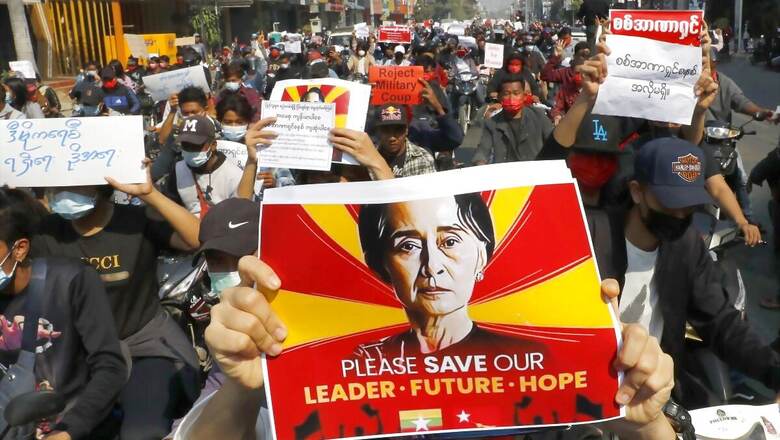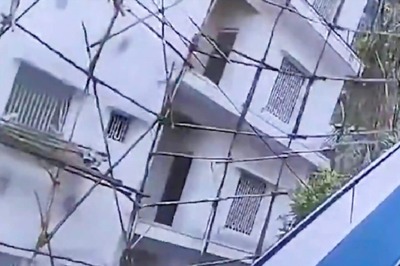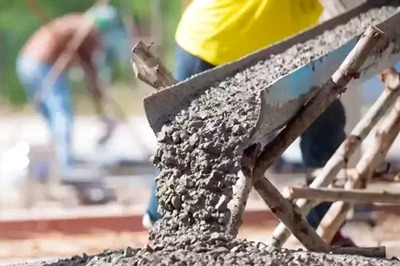
views
Myanmar’s ousted civilian leader Aung San Suu Kyi faces fresh corruption charges from the ruling junta that her lawyer said Thursday were “groundless” but could ensure she would never be able to return to politics.
The February 1 coup that toppled Suu Kyi’s government has brought hundreds of thousands into the streets to confront the generals, who have responded with a brutal crackdown that has left at least 200 dead.
The new military regime has already issued several criminal charges against the Nobel laureate since she was detained along with her top political allies.
Military broadcaster Myawady aired a video late Wednesday of a Myanmar businessman saying that he gave Suu Kyi $550,000 over several years.
Maung Weik said he had donated money to senior government figures for the good of his business. “Aung San Suu Kyi committed corruption and (authorities) are preparing to charge her according to anti-corruption law,” an announcer said during the broadcast.
Suu Kyi already faces other corruption allegations.
Last week a junta spokesman said a now-detained chief minister said he gave her $600,000 as well as more than 10 kilograms (22 pounds) of gold bars. “Those accusations are groundless,” Suu Kyi’s lawyer Khin Maung Zaw told AFP.
“Aung San Suu Kyi may have her defects… but bribery and corruption are not her traits,” he said.
However a bribery conviction in a case against her “personal character” could see Suu Kyi “prohibited from taking part in political activities,” Zaw told AFP.
A state-run newspaper also reported Thursday a charity foundation, named after Suu Kyi’s mother, is also under investigation for not paying enough fees on state-owned land that it uses.
Soldiers and police terrorised several battle-scarred Yangon neighbourhoods overnight Wednesday to Thursday as a mobile data blockade, combined with an internet shutdown, pushed scared residents further into an information blackout.
“Security forces threatened to shoot” residents if they did not remove the barricades that demonstrators have built across the commercial capital as they battle authorities, according to a doctor from the South Okkalapa township.
They also raided homes and arrested at least 10 people, he told AFP.
In neighbouring Thingangyun township, one man said he had heard continuous gunfire for 30 minutes before midnight, and said he put cotton buds in the ears of his two sons so they could fall asleep.
Even going out to buy food has become a terrifying ordeal he said, with residents forced to scramble through the streets to avoid facing patrols of trigger-happy security forces. “It makes me sad and furious as well… it’s like all our dreams (of democracy) have vanished,” he said.
Protesters were back on the streets Thursday, with some in Yangon testing a giant slingshot to shoot projectiles, while hundreds of civil servants marched in Mandalay and students and demonstrators rallied in Myangyan.
Demonstrators wore conical hats and marched with banners in the streets of Natmauk, the birthplace of Suu Kyi’s late father and independence hero General Aung San, while protesters also gathered at the World Heritage listed ancient city of Pyu.
The Assistance Association for Political Prisoners (AAPP) monitoring group reporting Thursday that more than 210 people have been killed so far in anti-coup protests.
Sunday was the bloodiest day, with the group recording more than 70 deaths across the country.
The bulk of the death toll came in Yangon’s Hlaing Tharyar — an impoverished garment-producing township mostly housing Chinese-owned factories — where the junta later imposed martial law.
Five other townships were also placed under martial law by Monday, putting nearly two million of Yangon’s 5.5 million residents under direct military control.
Any arrests made there will be tried in military courts.
The junta has justified the coup by claiming electoral fraud in the November 2020 elections that Suu Kyi’s party won in a landslide.
In Geneva, UN Human Rights experts said that states should consider using the principle of universal jurisdiction to prosecute people in Myanmar “responsible for acts that may amount to crimes against humanity.”
Since February 1 more than 2,400 people “have been detained and the whereabouts of hundreds are unknown,” experts with the United Nations office of Human Rights Special Procedures said in a statement.
The UN officials were especially outraged over a police and military raid last week on a compound housing 960 employees of Myanmar Railways and their families.
Many of them “were forcibly evicted at gunpoint as punishment for their participation in a nation-wide general strike,” the statement read, warning that such actions “constitute a gross violation of the right to adequate housing and several other human rights.”
Read all the Latest News, Breaking News and Coronavirus News here



















Comments
0 comment